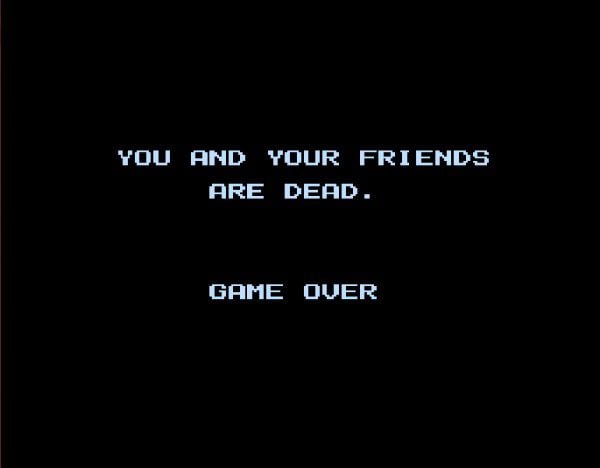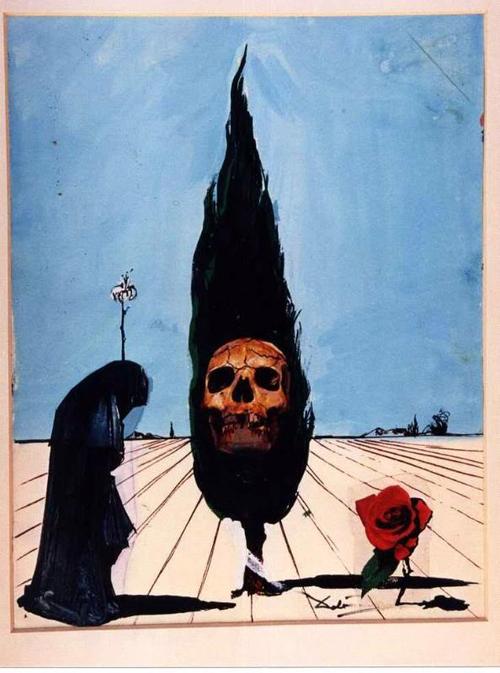
Let us grant the atheistic assumption that all humans are destined for non-being. There is nothing after death, only the absence of existence. Is it possible for man to conceive of this — non-being and pure absence? Is it possible for man to grasp what it means to be a corpse? Try. Conceive of Nothingness. Think on non-being.
Did you think of a large expanse of black? Try again, for you’ve thought of a large expanse of black, which is something. Of white? Nope, still something. Did you think of the word Nothing? That’s a thing. Did you think of a gap, an abyss or a hole? Perhaps that comes closer, but answer me this — did you think of the sides of the imagined gap? Those are things. Is it possible to think of a hole without its sides? No. Is it possible to conceive of pure absence?
Allow me take a left on red, cross the bridge, and get to the point.
1. Every thought we think is based on experience. (We cannot, for instance, conceive of a horse the color of which we have not experienced. (UPDATE: By which I mean, we cannot conceive of a color we have not experienced.))
2. Every experience we have is an experience of Something — of white, black, this girl, or that boy.
3. If we were to experience Nothing, it would not be an experience. (Nothing, inserted into any sentence, negates action. “I said nothing” means the action of speaking was not performed. “I felt nothing” means the action of feeling was not performed. It follows that the words “I had an experience of Nothing” means there was no action of experiencing.)
4. If there was no action of experiencing, then there can be no thought of the thing experienced, for all thought comes from experience.
5. It is therefore impossible to conceive of Nothingness, or non-being, or the ceasing of existence.
This makes sense, for we are beings. It is within our nature to be. To not be is a mystery, and an impossible thought, directly contrary to our nature. Words designated to indicate non-being, whether “Nothingness”, “Absence”, “Zero”, or “Non-being” itself are simply metaphorical labelings, similar — but not identical — to the way in which scientists label “dark matter”, giving a name to something they do not yet know.
This is why we are terrified by the corpse. The corpse is always a mystery, for it suggests (and only ever suggests, given that can never know precisely what the dead man experiences) a thought which we cannot think: The non-being of a human person. Thus we are the only animals in existence to react in fear to the sight of our own corpse. The corpse is a contradiction and a shock to the way we perceive the world. This is why we wander around in a confused state of numbness after a death, mumbling that we “can’t believe it happened.”
given that can never know precisely what the dead man experiences) a thought which we cannot think: The non-being of a human person. Thus we are the only animals in existence to react in fear to the sight of our own corpse. The corpse is a contradiction and a shock to the way we perceive the world. This is why we wander around in a confused state of numbness after a death, mumbling that we “can’t believe it happened.”
Really? We can’t believe it happened? We know that people becomes corpses, we know how they become corpses, we know how many become corpses each day, and we know we are on our merry way to becoming corpses ourselves — yet we cannot believe the death we truly experience (i.e. not the death we read about happening to some one we didn’t know existed in the first place.)
Why such disbelief? It’s simple. If we truly cannot conceive of non-being within ourselves, it only makes sense that the apparent non-being (death) of those we treat as ourselves (those we love) is inconceivable.
Thus, when the atheist says, as he is wont to, that after he dies he will “simply cease to be”, he is putting a metaphorical label on a mystery that he cannot — by his very nature — comprehend. He could equally say, with philosophical accuracy, that after he dies he does not know, nor can think of what will happen. For he can neither know nor think of Nothingness.
This is remarkably similar — if qualitatively different — to the Christian’s view of death. To simplify, the Christian says that after he dies he will experience Heaven. Heaven — disregarding supposed earthly experiences of it in beauty, goodness, truth, and love — is a mystery to him.
Both the Christian and the Atheist stand before death and make an act of faith — the atheist that he knows the unknowable, and the Christian that he expects the unexpected.
The Christian, in that he cannot truly conceive of his own Nothingness, has an innate conception of his own eternal Somethingness — of always being. The atheist, in that he cannot truly conceive of Nothingness, has the same. The Christian says that this innate conception is true, and that the corpse is but a mask of the actual experience of the human person after death — eternal life. The atheist says that this innate sense of always being, which comes from the universal inability to conceive of non-being, and has us scream at the sudden sight of the skull — that this is a lie, and that life ends in Nothing.
It seems to me something both could have beer over.











